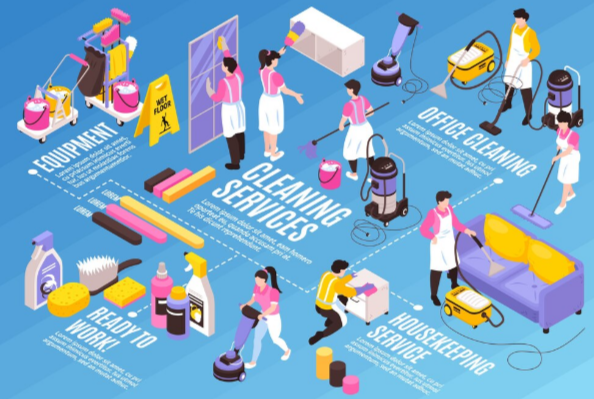Cleaning business is always demanding. Starting a cleaning business is a good idea to earn money with low investment. A lot of people and companies need cleaning services to clean their homes, offices or apartments.
This is a flexible business and anyone can do this part-time or full-time. You can take initiative from a small scale and grow business over time. There are a lot of clients in this business.
Here, you’ll learn how to start a cleaning business in 2025 from scratch. We have covered everything that you need to know before starting. Keep reading the article if you want to start cleaning business.
Do the Initial House Cleaning Service Yourself
When starting a cleaning business, it’s smart to handle the first few jobs on your own. This approach helps you save money, understand client expectations, and learn how much time and effort each job takes. Whether you’re learning how to start a house cleaning business or how to start a commercial cleaning business, doing the work yourself gives you first-hand experience that no training can match.
By working directly with your first clients, you build trust and collect valuable feedback. You also get a clear idea of what tools, supplies, and cleaning methods work best. This knowledge helps you set fair prices and improve service quality as your business grows.
If you’re starting from home and wondering how to start a home cleaning business, offering your services to friends, family, or neighbors is a good first step. These jobs can help you build a small portfolio and gain positive reviews, which will be useful for future marketing.
Doing the initial work yourself also shows your commitment. It builds a strong foundation for your business and allows you to train future employees more effectively based on real experience. No matter what niche you’re entering—be it window, pool, or home cleaning—your personal involvement in the beginning sets the tone for long-term success.
| Related Article: How to Write a Business Plan? |
Choose What Cleaning Services You’ll Offer
Before you fully launch your cleaning business, take time to decide what types of services you want to provide. This step is key because it helps define your target market, pricing, and marketing approach. Some people focus on how to start a home cleaning business, offering services like dusting, vacuuming, and kitchen cleaning. Others choose to specialize and learn how to start a window cleaning business or how to start a pool cleaning business.

If you’re more interested in working with offices or commercial spaces, you’ll need to explore how to start a commercial cleaning business. This usually involves larger contracts, more equipment, and sometimes working after hours. On the other hand, house cleaning or residential cleaning is more flexible and easier to start with low investment.
You can also offer add-on services such as deep cleaning, move-in/move-out cleaning, or seasonal clean-ups. These options can help you stand out and increase your income per client. Whichever path you choose, start small, and focus on what you can do well. As your business grows, you can expand into other areas.
Choosing the right services ensures you’re not stretching yourself too thin and allows you to build a strong reputation in your chosen niche. Whether you want to know how to start a cleaning company business in general or focus on specific types of cleaning, clear service offerings set the direction for everything that follows.
Set a Reasonable Cleaning Company Budget
Setting a budget is a crucial step when learning how to start a cleaning company business. It helps you manage your costs, avoid overspending, and stay on track. Many new business owners underestimate the expenses involved in starting even a small cleaning service. By planning your budget carefully, you increase your chances of success and long-term growth.
Start by listing your startup costs. These may include cleaning supplies, equipment, business registration fees, insurance, and basic marketing materials. If you’re focusing on how to start a house cleaning business or a home cleaning business, your initial costs may be lower since you can work alone and use simple tools. However, if you’re exploring how to start a commercial cleaning business, you might need to invest more in heavy-duty equipment and transportation.
Next, estimate your monthly operating costs. Include fuel, maintenance, supply refills, and any software or tools you plan to use for managing bookings and payments. Keep your budget realistic. You don’t need to buy everything at once—start with the essentials and upgrade as your income grows.
A clear and simple budget allows you to price your services correctly and ensures you’re making a profit. Whether you’re starting a window cleaning or pool cleaning business, understanding your financial limits will help you grow step by step without stress or surprises.
Register Your Company Name and Choose a Business Structure
Once you’ve planned your services and budget, the next important step is to register your cleaning business. This gives your company a legal identity and helps build trust with clients. Whether you’re learning how to start a home cleaning business or how to start a commercial cleaning business, proper registration is a must.
Start by choosing a unique and professional name for your business. Make sure the name reflects the type of cleaning services you offer. After deciding on a name, check if it’s available in your state and register it with your local business authority.
Next, choose the right business structure. Many cleaning startups begin as sole proprietorships because they’re easy to set up. However, forming an LLC (Limited Liability Company) is often a better choice. It protects your personal assets if any legal issues arise. This is especially important for those exploring how to start a cleaning company business on a larger scale.
If you plan to hire employees, apply for an EIN (Employer Identification Number) from the IRS. This number is also useful for opening a business bank account and filing taxes. By registering your business properly from the start, you build a strong foundation for long-term growth and avoid legal trouble down the road.
Obtain Necessary Licenses and Insurance
Before you begin offering services, it’s important to make sure your cleaning business meets all legal requirements. This includes getting the right licenses and insurance. Whether you’re figuring out how to start a home cleaning business or how to start a commercial cleaning business, being fully compliant builds trust and protects your business.

Licensing requirements vary depending on your location. In most cities or states, you’ll need a general business license. If you’re offering specialized services—such as those related to how to start a window cleaning business or how to start a pool cleaning business—additional permits may be required. Always check with your local government to make sure you’re following the rules.
Insurance is equally important. At a minimum, you should get general liability insurance. This covers any damage or accidents that could happen while you’re cleaning a client’s property. If you plan to hire employees, you’ll also need workers’ compensation insurance.
Having the proper licenses and insurance not only protects your business but also gives clients peace of mind. It shows you’re serious and professional, which can set you apart from unlicensed competitors. No matter which direction you choose for your cleaning company, this step should never be skipped.
Optimize Your Resources Through Automation
As your cleaning business grows, managing tasks manually can become overwhelming. This is where automation can save you time and help your business run smoothly. Whether you’re learning how to start a cleaning company business or expanding an existing one, using automation tools is a smart move.
Start by using simple software to handle scheduling, invoicing, and customer communication. There are affordable tools available that allow clients to book services online, send automatic reminders, and even process payments. These features help you deliver a better customer experience with less effort.
Automation is also useful for tracking expenses and managing your budget. Instead of handling everything on paper, you can use digital tools to monitor your cash flow and keep your business organized. This is especially useful for those managing multiple services, like how to start a house cleaning business and how to start a window cleaning business at the same time.
By streamlining your operations, you’ll have more time to focus on growing your business and finding new clients. Even small improvements—like automated follow-up emails or appointment confirmations—can make a big difference. Automation helps you work smarter, not harder, and keeps your business efficient and professional.
Profit First Financial Guidance for Your Cleaning Business
Managing money the right way is one of the most important parts of running a successful cleaning company. Whether you’re starting a house cleaning business or offering commercial cleaning services, your income may look good on paper—but it’s easy to spend too much and end up with little or no profit. This is where the Profit First system can help.
The Profit First method flips the traditional way of managing business finances. Most businesses follow this formula:
Revenue – Expenses = Profit
But with Profit First, you follow this instead:
Revenue – Profit = Expenses
This simple change forces you to take care of your profit, your own salary, and taxes first, then use the remaining money for running the business. It keeps you in control and helps you build a healthy, stable business from the start.
Here’s a sample Profit First distribution you can use:
| Category | Percentage | Purpose |
|---|---|---|
| Profit | 5% | Set aside as business savings or reinvestment |
| Owner’s Pay | 30% | Your personal salary as the business owner |
| Tax | 15% | Covers your yearly tax payments |
| Operating Expenses | 50% | All other costs: supplies, fuel, tools, etc. |
Example:
If you receive $1,000 from a client:
- $50 goes to Profit
- $300 goes to Owner’s Pay
- $150 goes to Tax
- $500 goes to Operating Expenses
Even if you can’t stick to these exact numbers in the beginning, you can start small—maybe just 1% profit. The key is to develop the habit of separating your money into these categories. You can open multiple business bank accounts or use budgeting apps to make this process easier.
By using the Profit First system, you’ll never have to guess if you’re making money. You’ll always have a clear view of your business finances, and you’ll grow with more confidence and control.
Optimize Your Online Presence
In today’s digital world, your online presence plays a major role in attracting customers. Whether you’re starting a house cleaning business or exploring how to start a commercial cleaning business, potential clients will search for your services online before contacting you. That’s why building and optimizing your online presence is essential.
Start by creating a simple, mobile-friendly website that clearly lists your services, pricing, and contact details. Use clear language and include relevant keywords like “how to start a cleaning company business” or “home cleaning services near me.” A clean and professional website builds trust and helps customers understand what you offer.
Next, set up a Google Business Profile. This makes your company appear in local search results and Google Maps, increasing your chances of getting new clients. Encourage satisfied customers to leave positive reviews—they improve your reputation and search visibility.
Don’t forget social media. Platforms like Facebook and Instagram are great for sharing before-and-after cleaning photos, client testimonials, and special offers. A strong online presence doesn’t require a big budget—it just needs consistency and helpful content. By showing up online, you make it easier for people to find and trust your business.

Reach Out to Your Target Market
Once your business is set up and your online presence is ready, the next step is to connect with the people who need your services. Whether you’re learning how to start a home cleaning business or planning how to start a commercial cleaning business, identifying and reaching your target market is key to growth.
Start by understanding who your ideal customers are. For residential services, your market may include busy families, working professionals, or elderly homeowners. For commercial cleaning, you might target offices, clinics, or retail spaces. Each group has different needs, so tailor your approach accordingly.
Use both online and offline methods to reach your audience. Post in local Facebook groups, join neighborhood forums, and print flyers for community boards or mail drops. Offer special discounts to first-time clients or referral bonuses to encourage word-of-mouth promotion.
You can also connect directly with property managers, real estate agents, or local businesses that may need ongoing cleaning services. Building relationships and showing reliability can help you win long-term contracts.
Reaching out actively—rather than waiting for clients to find you—shows initiative and helps build a solid customer base early on. No matter if you’re starting a window cleaning business, pool cleaning business, or a general cleaning company, knowing your market and reaching them effectively will help your business grow faster.
Start Marketing Your New Cleaning Company
Marketing is the final but ongoing step in building your cleaning business. After setting up your services, licenses, and online presence, it’s time to let people know you exist. Whether you’re figuring out how to start a cleaning company business or focusing on how to start a window cleaning business, good marketing brings steady clients.
Begin with local marketing. Distribute flyers, post on community boards, and advertise in neighborhood newspapers. Let friends and family know you’ve started your business—they can refer others to you. Word-of-mouth is powerful, especially in the cleaning industry.
Next, invest in digital marketing. Use your website to share useful content, such as cleaning tips or seasonal checklists. This not only boosts your SEO but also helps people find your business when searching online for services like how to start a house cleaning business or how to hire a cleaner near them.
You can also run low-cost ads on Facebook or Google targeting your local area. Make sure your ads highlight your services, affordable pricing, and customer satisfaction. Collect testimonials and showcase them on your website and social media pages to build trust.
Marketing is not a one-time task—it’s something you should do regularly to keep your business growing. Even simple steps like posting weekly updates or responding quickly to inquiries can set you apart from the competition. A strong marketing plan keeps your business visible, credible, and successful.
Conclusion
Starting a cleaning business may seem simple, but it requires careful planning, dedication, and the right strategies to succeed. Whether you’re exploring how to start a home cleaning business, a commercial cleaning service, or a more focused niche like window or pool cleaning, taking the right steps from the beginning sets the stage for long-term growth. By doing the initial work yourself, choosing your services wisely, setting a budget, and completing all legal requirements, you lay a solid foundation for your business.
FAQs
Q1. What is the initial cost for starting a cleaning business?
It doesn’t take much money—only between $300 and $1,000—to get your cleaning business running. This means you pay for basic tools, cleaning supplies and registration costs. Services and the scale of your business determine the size of your budget.
Q2. Is a license necessary before launching a cleaning company?
Some cities and countries require a business license or permit to operate legally. Check which licenses are required in your country and apply for them before you start.
Q3. How should I begin looking for clients in my cleaning business?
You could start by informing your family and friends about your business. Place flyers, post in local Facebook groups and make use of sites such as Craigslist. Give an introductory promotion to customers who are new to your business and look for referrals to obtain more clients.


1 Comment
Pingback: How to Start a Roadside Assistance Business Without Towing -